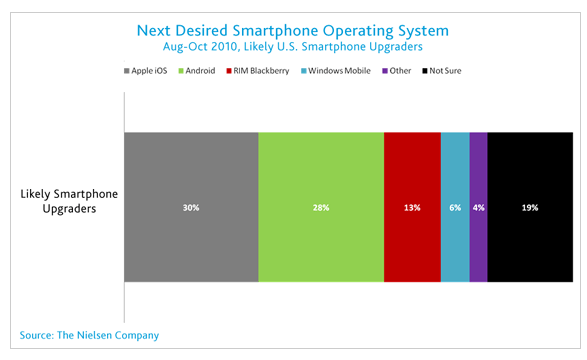Most desired mobile operating systems: The market is more up for grabs than you'd think

Nielsen on Wednesday revealed the details of its mobile OS beauty pageant handicapping the "most desired" platform. Not surprisingly, Apple's iOS and Android lead the most desired mobile OS parade. However, there's still a big chunk of the mobile operating system market up for grabs. Here's the breakdown:
- In terms of market share, the iPhone and Research in Motion's Blackberry each have 27 percent of the smartphone market share in the U.S. Android has 22 percent.
- Smartphones are 29.7 percent of the mobile phone market. Feature phones still dominate.
- Among folks looking to get a new smartphone, 35 percent of current smartphone owner preferred the iPhone. Twenty-eight percent of feature phone and smartphone upgraders wanted an Android device.
- Women prefer iPhone. Men prefer Android.
So it's a rout for iPhone and Android right? Not so fast.
Related: Have the mobile OS wars really been decided already?
Here's the most interesting part from Nielsen's data. Featurephone owners are more agnostic about platforms. Twenty-five percent of featurephone owners weren't sure what their next desired OS would be. Age matters in this group: Older people care decidedly less about the platform than younger ones.
The upshot: Featurephones dominate the market and there's a whopping 25 percent of owners up for grabs. Simply put, Android and iPhone may continue to dominate or BlackBerry, Windows Phone 7 or something else could land the featurephone crowd.
Now the featurephone is a murky definition. These phones are allegedly not as smart as their brainiac cousin devices. However, feature phones are more than enough for most of us to get by. Feature phones will add more capabilities and ultimately all devices will be a smidge smarter. Even so you'll have 20 percent of the market open to mobile platform options.
Check out Nielsen's stats on likely U.S. smartphone upgraders.
Go right to the black part of the chart and you'll find 19 percent of smartphone buyers aren't sure about the OS. That's an opportunity for RIM, Android and Apple. Even Windows Phone 7 could sneak in here. If you break likely smartphone upgraders by gender the market is even more wide open. Indeed, 23.8 percent of female smartphone upgraders aren't sure what mobile OS they want. For men, 14.9 percent are not sure.
Bottom line: There's still a significant chunk of the mobile platform wars yet to be decided.
